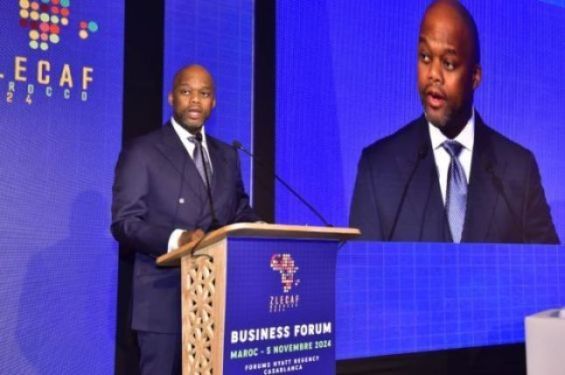Wamkele Mene, Secretary General of the African Continental Free Trade Area (AfCFTA), participated in the Business Forum dedicated to the region on Tuesday in Casablanca. Under the theme «Intra-African Trade: Perspectives and Opportunities», this event, initiated by the Moroccan Ministry of Industry and Trade and the Moroccan Confederation of Exporters (ASMEX), aims to support South-South cooperation. Government and economic representatives from various African countries are addressing investment and financing challenges through thematic roundtables.
In this context, Wamkele Mene emphasized that before the AfCFTA agreement came into effect, Africa had territorially disparate tariff regimes, which «constituted a significant obstacle for exporters seeking access to markets in regions or countries» within the same continent. Thanks to this pact, «we now have, for the first time», centralized information for all economic operators and «a single tariff for trade exchanges across the five regions of the African continent», he stated.
«An economic operator can now precisely identify the tariff that will apply to their exported product, according to the country or region. This tariff regime is now harmonized across the 48 member states of AfCFTA», indicated Wamkele Mene, adding that another important tool remains «the Pan-African Payment and Settlement System», in a continent with 42 different currencies.
Addressing country-specific challenges to strengthen regional dynamics
«The cost of convertibility is estimated at nearly 5 billion US dollars per year. In practical terms, this means our economic operators spend this total amount to buy a third currency to be able to trade on the continent», explained Wamkele Mene, describing it as «a substantial obstacle, particularly for small and medium enterprises».
«In collaboration with AfCFTA, we have an African Union Commission, and we have developed the Pan-African Payment and Settlement System, which was launched three years ago in Accra, Ghana. This is a digital innovation that allows payment in local currency», recalled the Secretary General, emphasizing that this is the key to addressing many challenges related to currency payment interoperability.
Another implemented tool is the AfCFTA Adjustment Fund, which identified the need for «a support mechanism so that countries and the private sector can actively benefit from the market offered by the Zone, immediately».
«We have mobilized approximately 1.2 billion dollars to enable parties to access this fund, ensuring their export readiness and ability to benefit from AfCFTA advantages. Furthermore, we are committed to raising up to 10 billion dollars from our development partners, the African private sector, pension funds, and private equity funds in Africa, to ensure we invest in our own industrial development as a continent».
In this regard, Wamkele Mene notes that investors in the AfCFTA Adjustment Fund «will see returns on their investments while financially contributing to Africa's industrial development».
Strengthening trade finance for small businesses
Another tool, not yet finalized pending negotiation results, concerns trade financing for better inclusion of small and medium enterprises and young entrepreneurs.
«So far, we have mobilized approximately 7 billion dollars from African commercial banks to ensure access to affordable trade financing, which will allow our small and medium enterprises in general, but particularly our private sector, to develop their activities through investments and reach other AfCFTA markets», stated the Secretary General.
For him, «this is an important start» towards mobilizing larger private sector financing for trade in Africa. «We are pleased and looking forward to partnerships with banks, commercial banks in Morocco that can contribute to mobilizing private sector funds to reduce the cost of trade finance in Africa», he declared.
Through partnerships with African banks, individual businesses on the African continent are also supported through the creation of what AfCFTA calls «trade aggregation companies». The objective is thus to «consolidate small producers' outputs, enabling economies of scale and better market access», whether in agriculture, technology, manufacturing, or services sectors.
In this regard, Wamkele Mene welcomed the «strategic investment from African banks and this partnership that underscores the commitment to strengthening trade capabilities» within the framework of the AfCFTA agreement. On this note, he stated that he encourages operators on the continent to «work with the Ministry of Trade here in Morocco, to collaborate with the AfCFTA secretariat, to identify export and import opportunities in the 48 member states».




 chargement...
chargement...












